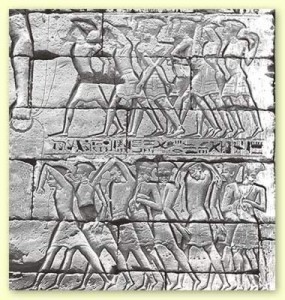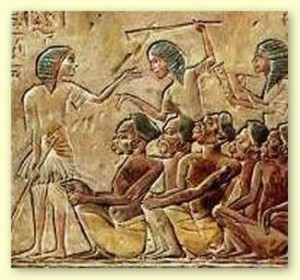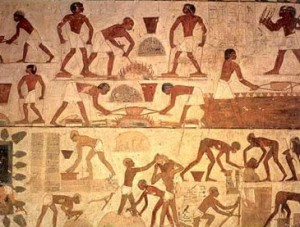In the biblical account of the Exodus, Moses leads a multitude out of Egypt.
This multitude followed Moses for 40 years, wandering in the desert being cleansed and made ready to receive the things that God had promised to Abraham, Issac and Jacob. I touched on something in my last post, What Color or Race Are Gods Chosen People, that was purely speculation on my part. Writing that post was an emotionally draining experience because I was determined to boldly convey what I felt to be true, but I was ever conscious of the sensitivity of the subject and the potential to offend. After the fact, I felt a need to dig deeper into the historical record to better understand who the people were that Moses led out of Egypt, carrying with them the spoils of this once powerful kingdom, and to find within this story the pearls of wisdom we can apply to our lives today.
This is the biblical account from Exodus 12:37-38 KJV
“And the children of Israel journeyed from Rameses to Succoth, about six hundred thousand on foot that were men, beside children. And a mixed multitude went up also with them; and flocks, and herds, even very much cattle.”
Whew! Apparently my speculation was well grounded, and not just something stuck in my brain from the narration of Cecil B. DeMille’s version of The Ten Commandments. I was still curious what the historians had to say on the subject and was able to find some great background material that puts the exodus out of Egypt in a historical perspective.
Two websites I found to be enlightening were the Institute for Biblical & Scientific Studies and Tour Egypt. I also picked up some tidbits from articles I found about slavery in ancient cultures, specifically Egypt and her ancient neighbors. Slavery was common in the developing ancient empires because the rulers had high aspirations, an abundance of land, and a shortage of workers.
To understand what this mixed multitude coming out of Egypt with the children of Israel means, we need clarity on who they were.
 Let’s start with what defined who would be a free man and who would be a slave. During the middle kingdom rule, Egypt was expanding into the kingdoms of her neighbors. The middle kingdom foreign slaves came mainly from Asia. They were either prisoners of war or slaves from surrounding nations traded by slave merchants. Egyptians were sometimes sold into slavery because of debts, or sold themselves along with their families to escape poverty. Apparently for some, the economic security they gained as indentured servants was worth giving up some freedoms for. Convicted criminals were also forced into lives of labor. Most of these people would likely have longed to get out of Egypt and out of bondage.
Let’s start with what defined who would be a free man and who would be a slave. During the middle kingdom rule, Egypt was expanding into the kingdoms of her neighbors. The middle kingdom foreign slaves came mainly from Asia. They were either prisoners of war or slaves from surrounding nations traded by slave merchants. Egyptians were sometimes sold into slavery because of debts, or sold themselves along with their families to escape poverty. Apparently for some, the economic security they gained as indentured servants was worth giving up some freedoms for. Convicted criminals were also forced into lives of labor. Most of these people would likely have longed to get out of Egypt and out of bondage.
As Egypt evolved into what historians refer to as the new kingdom, the pharaohs became more committed to conquest and the number of slaves increased with the flood of prisoners of war from conquests in Nubia, Canaan and Syria.
During later campaigns, slaves were often part of the tribute and taxes paid by the defeated. It is recorded that during the reign of Thutmose III, the tribute received from the Hittites included eight male and female black slaves. The Hittites considered them to be a valuable gift as black people were rare in their culture. There are also slaves recorded as payment for taxes from Nubia and Kush.
Now, imagine the day that Pharaoh, having been broken by the final plague God thrust upon Egypt, the death of the firstborn, including the heir to his throne, tells Moses to take his people out of Egypt. Slaves from Nubia, Canaan, and Syria, and the black slaves acquired from the Hittites along with their families having survived the 10 plagues along with the Egyptians, become the “mixed multitude” of Exodus 12:38, following Moses out of Egypt. They all follow Moses to the foot of mount Sinai to receive the law. They sinned with the children of Israel and were punished with the children of Israel for their disobedience.
In Exodus chapter 19, God instructs Moses what he is to say to the great multitude gathered at the base of Mount Sinai.
Exodus 20:1-6 KJV
“And God spake all these words, saying, I am the LORD thy God, which have brought thee out of the land of Egypt, out of the house of bondage. Thou shalt have no other gods before me. Thou shalt not make unto thee any graven image, or any likeness of any thing that is in heaven above, or that is in the earth beneath, or that is in the water under the earth. Thou shalt not bow down thyself to them, nor serve them: for I the LORD thy God am a jealous God, visiting the iniquity of the fathers upon the children unto the third and fourth generation of them that hate me; And shewing mercy unto thousands of them that love me, and keep my commandments.”
There is nothing exclusionary in this passage. God is speaking to all of the people He brought out of Egypt with a mighty hand and an outstretched arm. If you were among the people that were brought out of Egypt, (those who had faith to follow) then He would be your God! That, my brothers and sisters, is as true today as it was then. Whatever has you in bondage, whether it is drugs, alcohol, a nasty temper, laziness, pornography, racial prejudice, or anything else that prevents you from walking with God, places you in your very own Egypt. God wants you out of Egypt, but it is up to you to be willing to leave, and have the faith to follow Him.
Blessings & Adventure,
Lynn “lynnibug” Rios
“For what great nation is there who has a god so near to them as the Lord our God is to us in all things for which we call upon Him?” Deuteronomy 4:7
He is faithful and if you but ask Him, He will lead you out of Egypt.




That’s very cool. Thanks for the post.